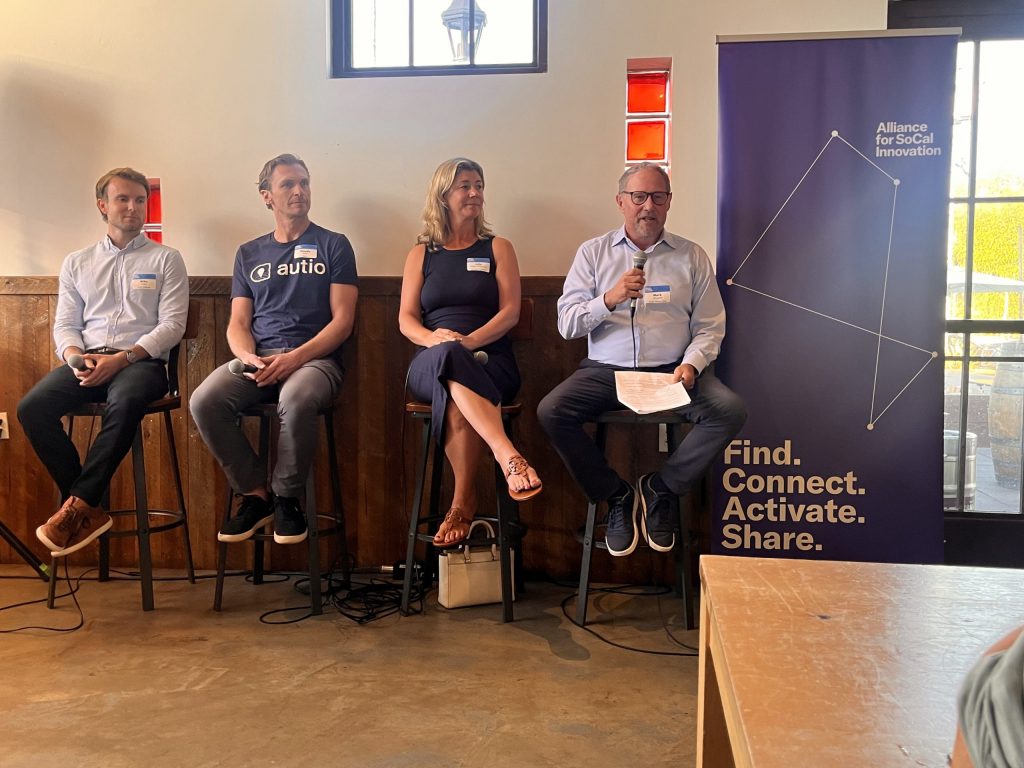Finding funding: Area venture capitalists, founders share advice

Correction: A previous version of this article called The Alliance for SoCal Innovation by the wrong name.
It is no secret that funding from venture capital firms has slowed down tremendously in 2023 with the global market funding about $144 billion in the first half of 2023, a 51% decline from the same time period in 2022.
However, that doesn’t mean that there aren’t good entrepreneurs with good ideas in the market and it doesn’t mean that funding won’t ever return.
As a result, strengthening pitches, expanding one’s network and remaining a positive outlook is important for founders going forward.
At least, that is what Woody Sears, founder of Autio, said during a panel discussion on the state of funding in 2023 hosted by the The Alliance for SoCal Innovation.
Other panelists included venture capitalists from Santa Barbara-based firms — Julie Henley McNamara of Entrada Ventures and Mike Tucker from ScOp Venture Capital — who provided insight for a room of nearly 30 founders who gathered at the Santa Barbara Biergarten on Oct. 10.
Sears’ company Autio, which is an app that creates educational audio narratives, recently closed a seed round worth $5.5 million in January.
“You want to have lots of options. Even once you get close to a term sheet or get a term sheet, it’s always good to keep pushing on the gas even though it’s easy to get distracted by building and continuing to grow the company,” Sears said.
Entrada Ventures specializes in funding early-stage companies through seed and beyond.
McNamara said that especially for those companies in the early seed stage raises “not all money is created equal.”
“Find the people you connect with and talk to a lot of people,” she said.
“It’s not about being desperate and needing money, but also finding the right people to help grow the business.”
Tucker noted that for early-stage founders “time is money.”
“You have to be careful with your time,” he said.
The three also spoke on how founders pitch and particularly focused on one angle — do not lie to investors to make the company sound better.
“One of the things we can tell really fast is if someone is being dishonest,” Tucker said, adding that the firm listens to about 25 pitches a week.
“Whatever’s going on with the business, we will really appreciate authenticity. Authenticity is number one — even if you’re not really happy with the metric, just report it and talk about why it is that way for now and how it can be improved.”
“We are going to be under the hood so don’t lie,” McNamara said.
From the founders side, Sears agreed and added that it’s also okay as a founder to not have all the answers on a particular question.
“I don’t think it’s a bad thing to say, ‘that’s a great question. I don’t have the answer right now,’” Sears said.
“These are long-term relationships you are forming, so don’t make anything up because that will never work out.”
Now for the founders looking to do their due diligence on investors and firms, all three agreed that the best way to do so is to talk to other portfolio companies.
McNamara and Tucker said their firms often will recommend people that they have already invested in to speak with for new founders.
All three also spoke highly of Santa Barbara and the community created between founders, angel investors and venture capital firms.
“I have met with some VCs who weren’t even in our vertical or in our category and they were helpful in giving advice and making connections later,” Sears said.
“It is fantastic advice to tap into these knowledgeable folks.”
email: [email protected]








